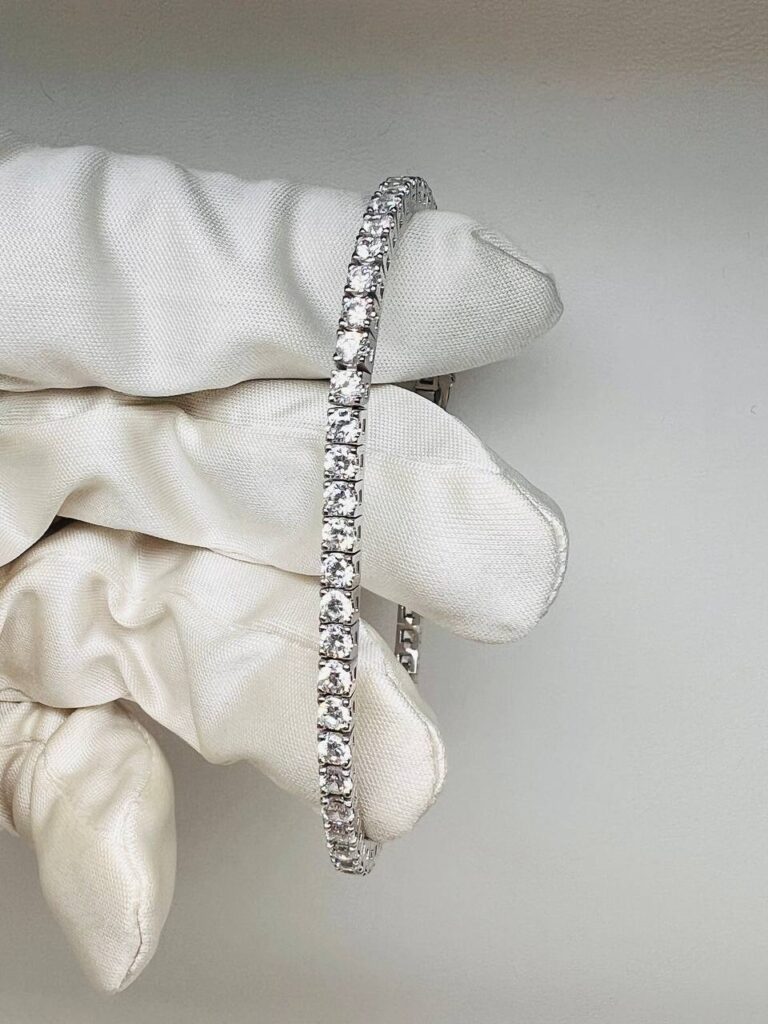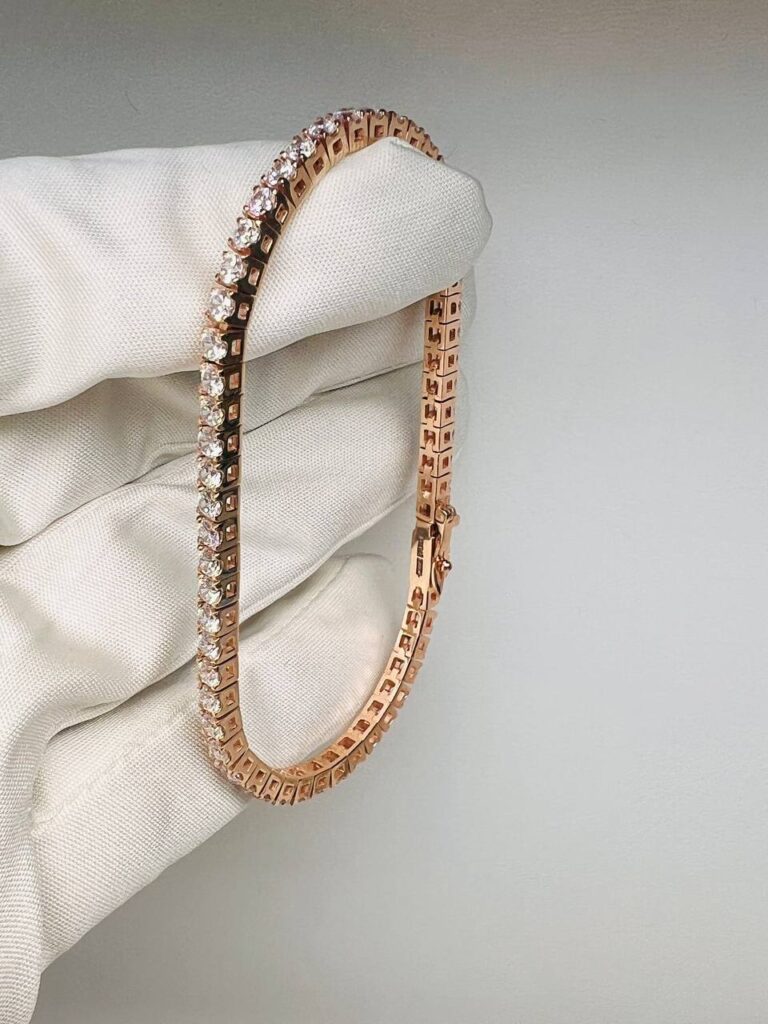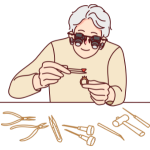The term “tennis bracelet” wasn’t always part of jewelry vocabulary. That changed in 1987, when tennis player Chris Evert lost her diamond bracelet during a US Open match.
The game was paused, and the term stuck. A tennis bracelet typically features a symmetrical line of diamonds or gemstones set in gold or platinum.
It’s known for its secure clasp, elegant simplicity, and versatility. This guide breaks down what makes a tennis bracelet unique, how the style evolved, and what to look for when buying one.
What Is a Tennis Bracelet?
A tennis bracelet is a thin, flexible band worn around the wrist. It holds a line of small, high-quality diamonds or gemstones, usually in a symmetrical pattern.
The stones are linked together with precious metals like 18k gold, white gold, or platinum. This style of bracelet offers a balance of sparkle and sophistication, making it a staple in diamond jewellery collections.

What Does “Tennis Bracelet” Mean?
The name comes from a moment during the 1987 US Open. Professional tennis player Chris Evert lost her diamond bracelet during a match.
She asked to pause the match to find it. Since then, this piece of jewelry has been called the “tennis bracelet.” That single event gave the bracelet its now famous tennis label.
What Does a Tennis Bracelet Look Like?
A classic tennis bracelet usually features:
- A single strand of small diamonds
- A symmetrical line of uniform stones
- A secure clasp to hold it during movement
- A sleek geometric design
Tennis bracelets often pair well with a watch or can be worn solo for a chic, stylish look.
What Is a Tennis Bracelet Style?

The style of a tennis bracelet is all about minimalism and elegance. It’s not bulky. It’s not loud.
It’s about refined beauty—a row of matching stones, often round brilliant, sometimes emerald cut, that sit close together and flow smoothly across the wrist.
Some call it a type of eternity bracelet, especially when the stones go all the way around without a break.
You can find them in varying sizes, karat levels, and with different total carat weight depending on your budget and preference.
This classic design never goes out of style. It’s made for everyday wear or for special events—the perfect tennis bracelet is one you forget you’re even wearing.
What Is a Diamond Tennis Bracelet?

A diamond tennis bracelet is an elegant, flexible band that consists of a balanced row of diamonds , often set in gold vermeil, sterling silver, or solid gold.
It blends function and luxury, designed to be secure enough for active wear while still displaying the brilliance and precision of fine diamond jewellery.
Diamond tennis bracelets feature stones of equal or similar size, cut, and clarity, forming a clean, geometric shape that wraps around the wrist.
Whether worn alone or as a tennis bracelet with a watch, it’s become a staple for those who appreciate subtle luxury and classic tennis bracelet style.
What Makes a Tennis Bracelet?
A true tennis bracelet includes:
- A symmetrical pattern around the wrist
- Smaller stones or diamonds placed in a straight line
- A strong, hidden clasp for movement security
- A setting in precious metal (typically gold or silver)
Each bracelet is built for durability and flexibility—tennis bracelets tend to move freely without twisting or breaking.
The design of a tennis bracelet is made to feel almost weightless, yet its sparkle makes it a standout symbol of elegance.
What Is Tennis Jewelry?
Tennis jewelry refers to lightweight, secure, and flexible diamond-set pieces suitable for active lifestyles—originally inspired by tennis culture.
These include bracelets, necklaces, and sometimes rings that are designed to stay put during movement. They combine style with structure, making them ideal for everyday wear.
The meaning behind tennis jewelry comes from blending sport with refinement. Pieces like the diamond tennis bracelet serve not only as accessories but as chic, timeless statements.
Whether you’re on the tennis court or at a formal event, the look remains refined, modern, and unmistakably stylish.
Tennis Bracelet vs Regular Bracelet
Most regular bracelets—like bangles, cuffs, or chain link designs—don’t prioritize balance or stone alignment.
They might use a mix of textures, feature charms, or focus more on metalwork than on brilliance. But a tennis bracelet is an elegant and streamlined piece of jewelry, defined by its consistent size of stones, secure clasp, and lightweight flexibility.

Key Differences Between a Tennis Bracelet and Other Bracelets
| Feature | Tennis Bracelet | Regular Bracelet |
|---|---|---|
| Stone Placement | Symmetrical line of stones | May have no stones or irregular spacing |
| Structure | Flexible, uniform design | Varies: cuff, bangle, chain, or charm-based |
| Materials | Often white gold, sterling silver, gold vermeil | Includes leather, fabric, mixed metals, etc. |
| Purpose | Both chic and functional for daily wear | Style-oriented; less focus on movement security |
| Secure Clasp | Designed to stay on during activity | May use basic clasps or open designs |
How to Buy a Tennis Bracelet
Buying a tennis bracelet isn’t just about picking something that sparkles. It’s about understanding the design, quality, and fit.
A true tennis bracelet is defined by its symmetrical pattern, secure clasp, and flexible setting—each detail affects how it looks and wears.
Whether you’re choosing diamond jewellery or gemstones, the goal is to find a piece that balances elegance, durability, and comfort on your wrist.
Key Features to Look For
Before you buy, check these essentials:
1. Stone Quality
Look at the 4 Cs—cut, color, clarity, carat weight. For diamonds, a well-cut round brilliant or emerald cut maximizes sparkle.
2. Total Carat Weight
This affects both price and look. More isn’t always better—smaller stones with high clarity often look cleaner and are more wearable.
3. Metal Type
Choose from 18k gold, white gold, platinum, or sterling silver. These precious metals impact durability and tone.
4. Clasp and Flexibility
The clasp must be secure. Look for a double safety or box clasp. Flexibility helps the bracelet move with your wrist and prevents stress on links.
5. Length and Fit
Measure your wrist for the perfect fit. A tennis bracelet should sit comfortably—not too tight, not too loose.



Leave a Reply